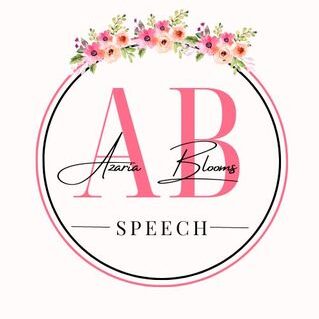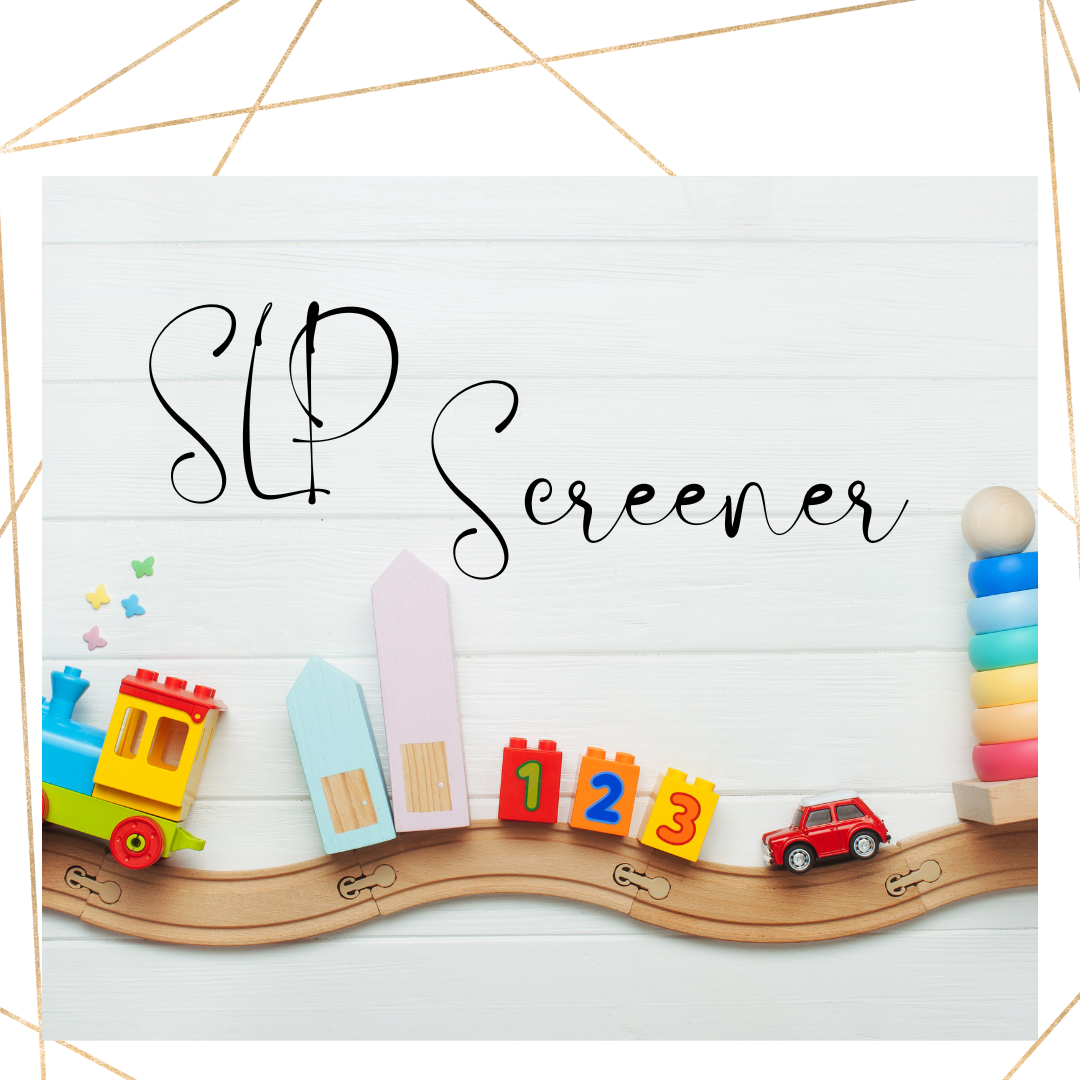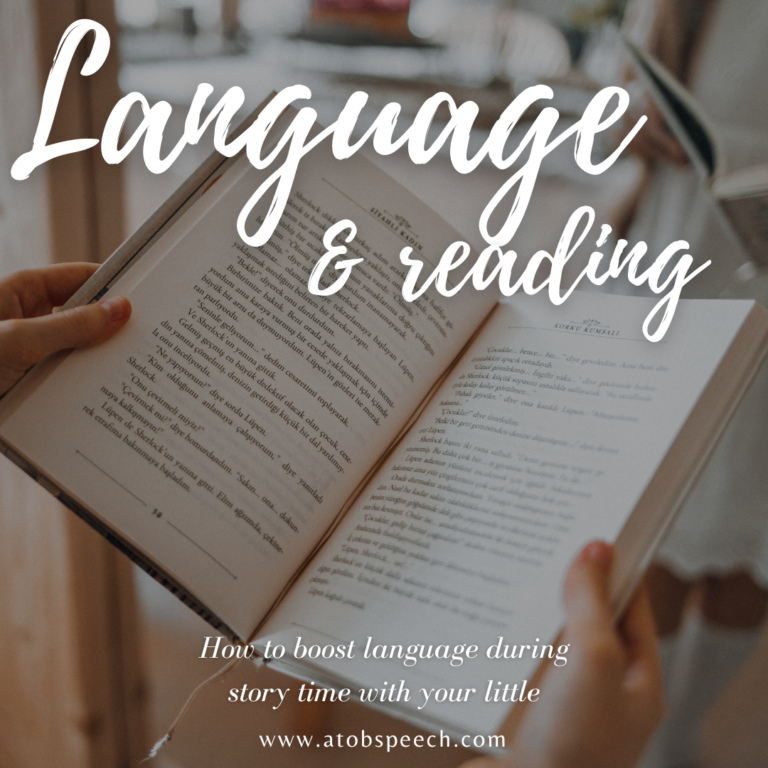Screenings 101
Have you ever wondered what a speech and language screening is? Perhaps you’ve heard of speech and language screenings through your child’s school or daycare…but what IS a screening and how do you know whether a speech and language screening might be beneficial to your little? Without further ado…here are the top speech and language screening questions, answered!
Screening Questions & Answers
- What is a speech and language screening?
- A speech and language screening is a tool that SLPs use to gain a short ‘snapshot’ of speech and language skills. It allows the SLP to look at a variety of skills and determine how those skills are developing. A screener can help to determine whether your little one might benefit from some support and whether further information is needed, or whether their skills are right on track. Based on this information, the screening can provide the SLP with information about whether it would be beneficial to take a closer look at any of the speech and language skills through an assessment.
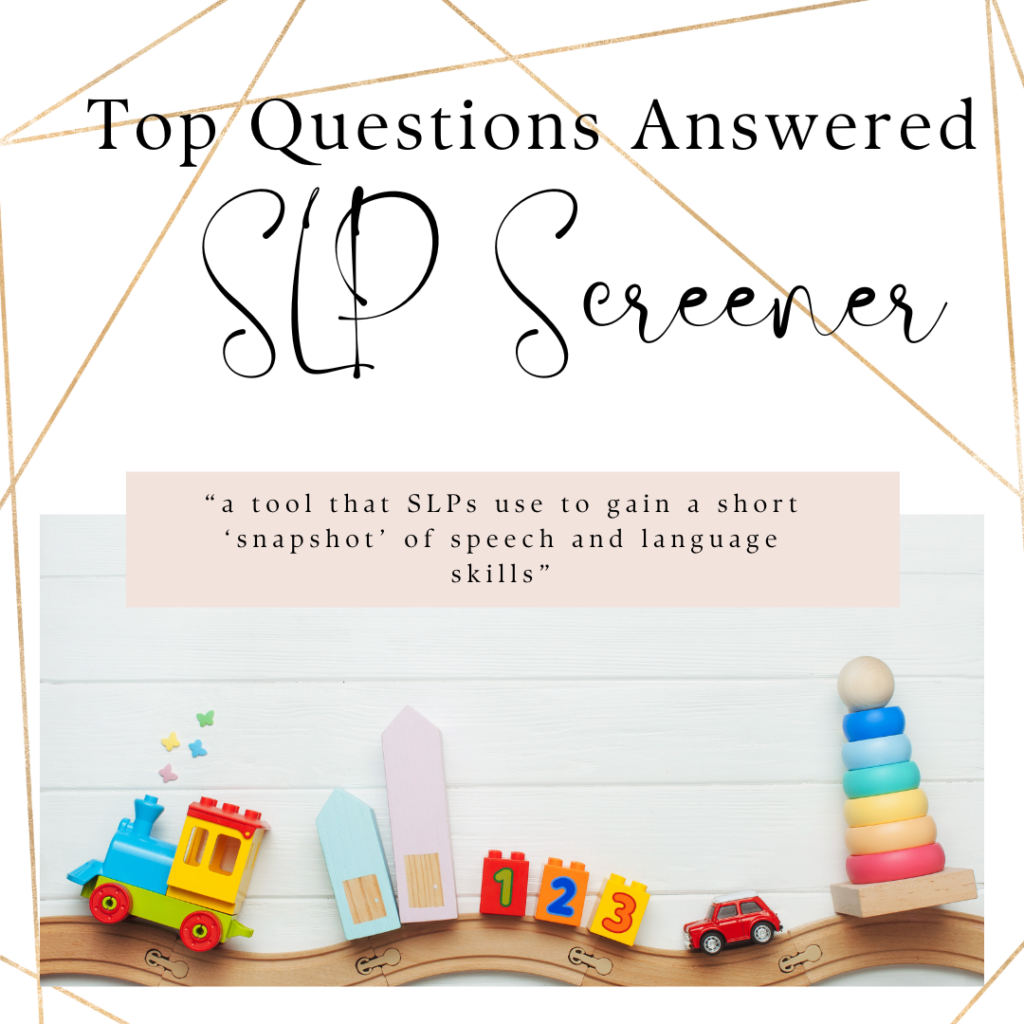
2. What types of skills might be addressed in a speech and language screening?
Some skills that might be looked at during a screening include, but are not limited to:
- Articulation and phonology (identify if there are any difficulties producing specific speech sounds or patterns)
- Fluency (identify any disruptions- disfluencies or stuttering- that are not expected for the child’s age)
- Expressive and Receptive Language (use and understanding of vocabulary, answering questions, processing of language, use and understanding of sentence structure, grammar etc.)
Depending on your child’s age and any concerns (if you have any), screenings may also include
- a snapshot of literacy-based language skills (listening comprehension, phonological awareness, reading or writing skills).
- Social skills, problem-solving skills
- Higher-level language skills (inferencing, predicting, making connections etc.)
3. What is the purpose of a speech and language screening?
A speech and language screening helps to identify whether assessment would be beneficial in any of these areas. A speech and language screener can help SLPs to identify if there is a possibility that there is a delay or difficulty in one or more speech and language skills. If the screener indicates that the possibility of a difficulty is present, the SLP will recommend an assessment to take a deep dive into the specific skill set to determine strengths, weaknesses, and whether speech and language support is indicated based on the scores.
4. How long does a speech and language screening take?
The length of the screening depends on the type of screener that is selected, the depth of the screener, and the child’s age! At A to B Speech Therapy, we typically aim for our screeners to take 15-30 minutes depending on the child’s age and the type of screener being completed (informal vs. formal)!
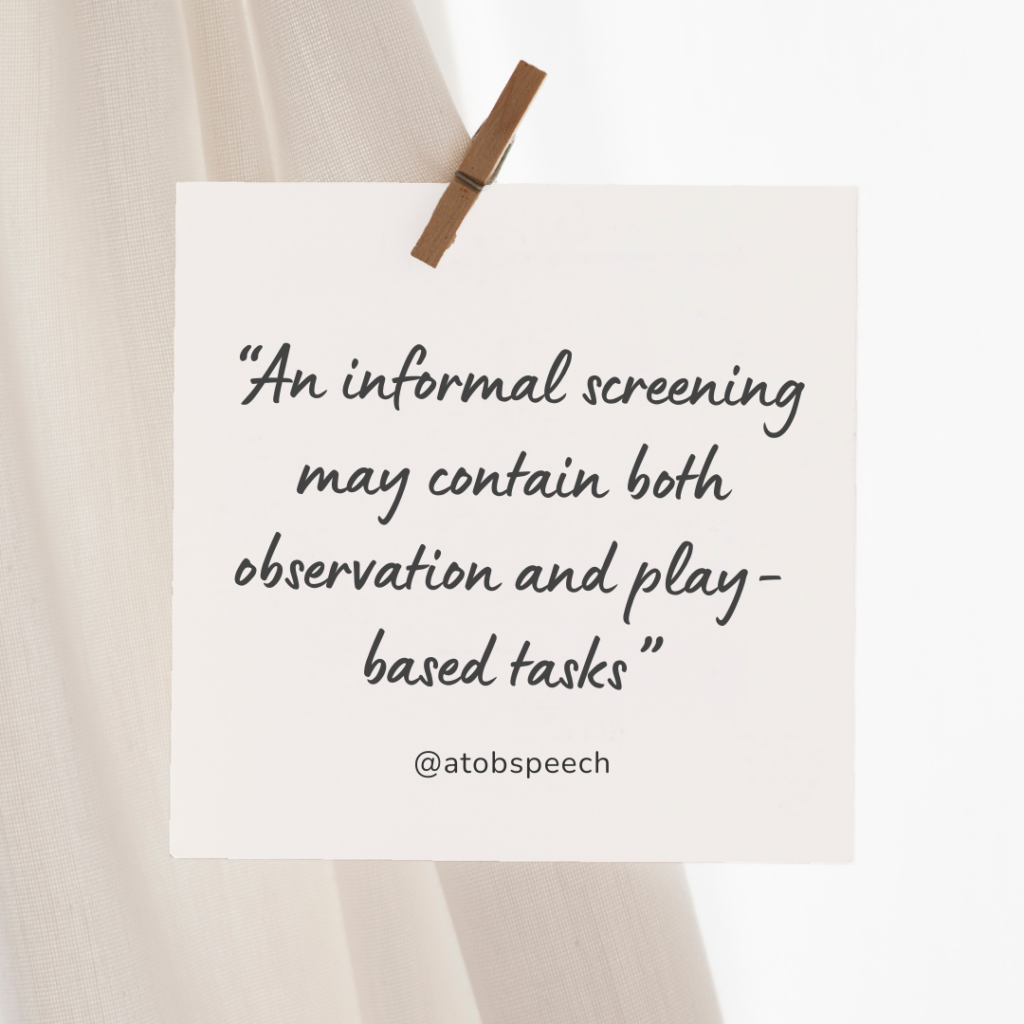
5. What is the difference between a formal and informal screening?
An informal screening may contain both observation and play-based tasks. This type of screening does not follow a formal protocol and may also include informal questions that the SLP asks the child to observe skills like functional communication, sentence formulation, answering -wh questions, retelling events, identifying commonalities and more. A formal screener often follows some type of structure and the clinician generally has specific tasks that they engage the child in to look at a criterion checklist of skills. At A to B Speech Therapy, we like to incorporate play-based or interest-based activities as well as brief parent interviews in both types of screenings! We use the child’s age, interests, and areas of concern (if there are any) to determine which type of screener to use! A parent discussion with results from the screening is a part of both types of screening methods.
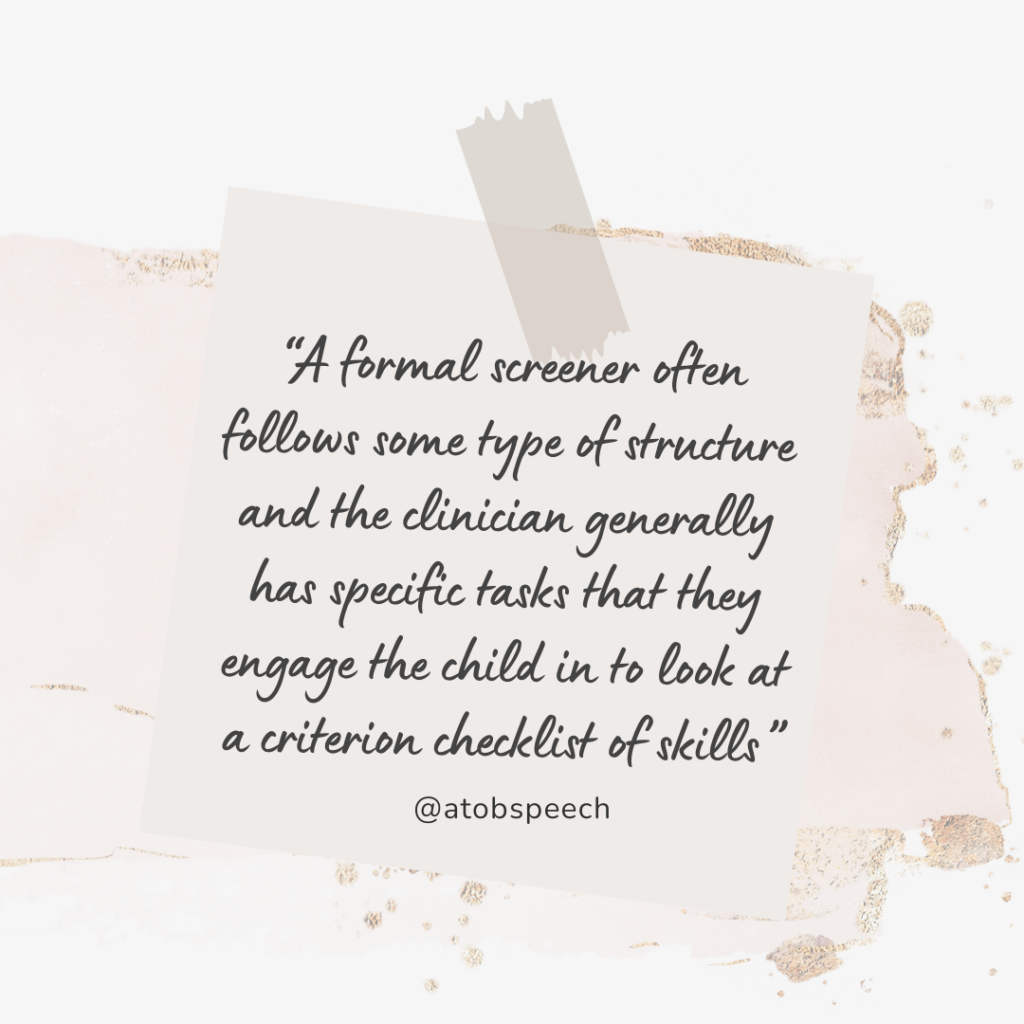
6. What is the difference between a screening and an evaluation?
Firstly, A screening is shorter in length because it is not intended to fully assess or evaluate skills as an evaluation does. Instead, a screening is a quick glance at a broad range of skills under the speech and language umbrella. A screening can help SLPs to determine whether an evaluation would be beneficial by identifying any areas of weakness from the screening. If the screening indicates that there is a need for evaluation, an assessment plan will be developed to include a full, in-depth look at specific skills and overarching skill areas.
Secondly, a screening does not result in a standard score, whereas a formal assessment where standardized measures are utilized yields a standard score (a standardized score is one that explains how a child performs compared to their same aged peers on an assessment that has been researched in order to achieve an average from a sample; the standardized score tells us how close the student’s performance is to average).
Thirdly, a screener does not give clinicians enough information to make a determination about whether speech and language support is indicated. An evaluation/assessment is the first step in determining whether intervention is indicated as well as what goals should be addressed in the intervention plan.
At A to B Speech Therapy, a written report is not part of the screening process. With a formal evaluation, a full written evaluation report is crafted which includes information from the clinician’s conversation with the caregivers, any formal and informal measures conducted, checklists, observations, and history. A separate follow-up meeting with the caregivers will also be planned to explain the results of testing, determine whether intervention is indicated, share recommendations, and create a plan based on caregiver input, evaluation findings, and clinical judgement.
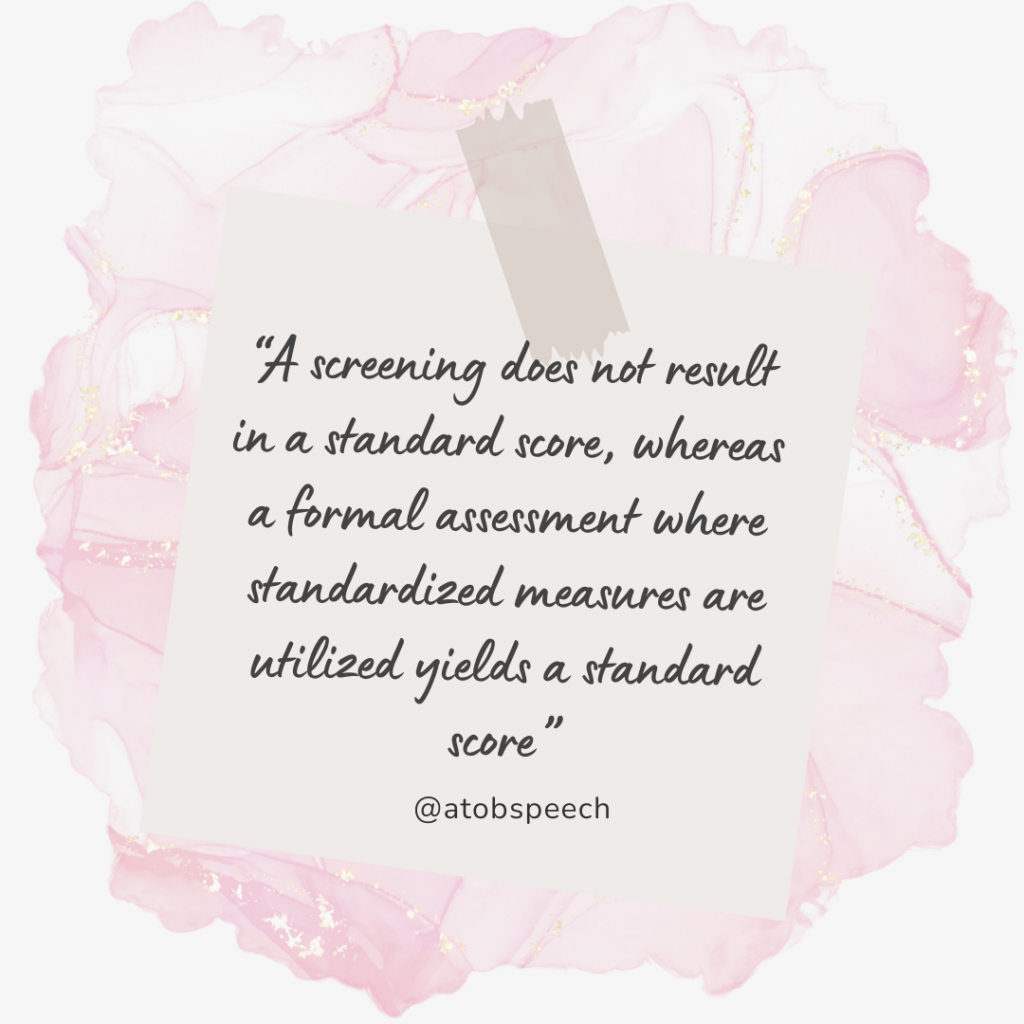
7. How do I know if my child might benefit from a speech and language screening?
Children might benefit from a speech and language screening for a number of reasons. Below are a few things to consider when deciding whether to request a screening for your little, but please remember to consult with a SLP if you are unsure. Pediatricians and teachers are another great resource for identifying whether a screening or evaluation is a good idea…we advocate for the earliest intervention, so if you notice something that feels off or you are unsure, reach out rather than waiting it out! Working on tricky skills early on is the best way to help your little and promote those early skills. Please see where to find a list of SLPs near your area here. You can also always reach out to us with any questions ([email protected]). Without further ado, here are some signs that you might want to consider reaching out to an SLP for a quick screener:
- If your little is having difficulty understanding you or following directions
- If your little seems to have a difficult time expressing ideas
- If your little is having difficulty pronouncing words or producing sounds that are age-appropriate
- If your little is getting frustrated due to having a difficult time expressing wants and needs
- If you notice a regression in skills
- If your little is having a difficult time with any developmental milestones expected for their age and/or those leading up to their age (see this chart)
8. What can I expect after the screening is complete?
After the screening is complete, the clinician will provide information about how the child performed on the screening and whether there were any areas of difficulty that indicate the need for a full evaluation. If an evaluation is not indicated, the SLP may recommend a referral to another discipline (OT, PT etc.) and/or may recommend that a follow-up be conducted in a set period of time. Other times, the screening may result in no further action needed and general enrichment activities and strategies will be provided.
Next Steps & Final Thoughts
Do you have any additional questions about screenings and/or speech and language development? Don’t hesitate to reach out to us or a local SLP (you can find a list of SLPs by location here). If you would like to book a screening with A to B Speech Therapy, we provide virtual therapy screenings in CT, SD, and FL and in person speech and language screenings in your home or school in CT. Please reach out to us at [email protected] in order to schedule a screener or call.
This post may contain affiliate links, this means that we could receive a commission when you click on one of our links and purchase something that was recommended. In some cases, we may be compensated for writing this post. Don’t worry, it is at no extra cost to you and all opinions and recommendations shared are truly our own! See our full policy here. Please note that the information on this website is for educational purposes only and does not replace or constitute professional advice. Please see our full disclaimers here.
